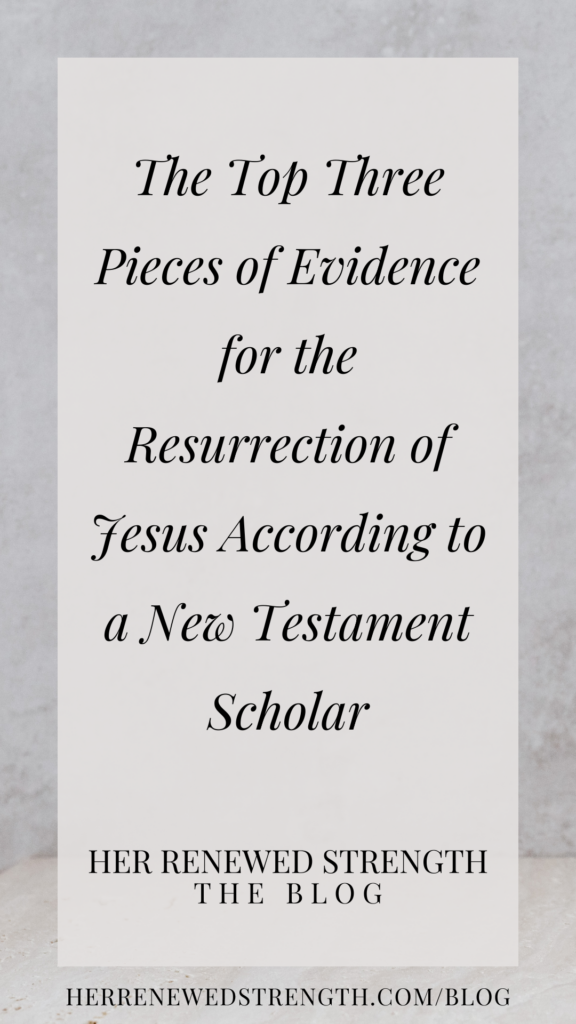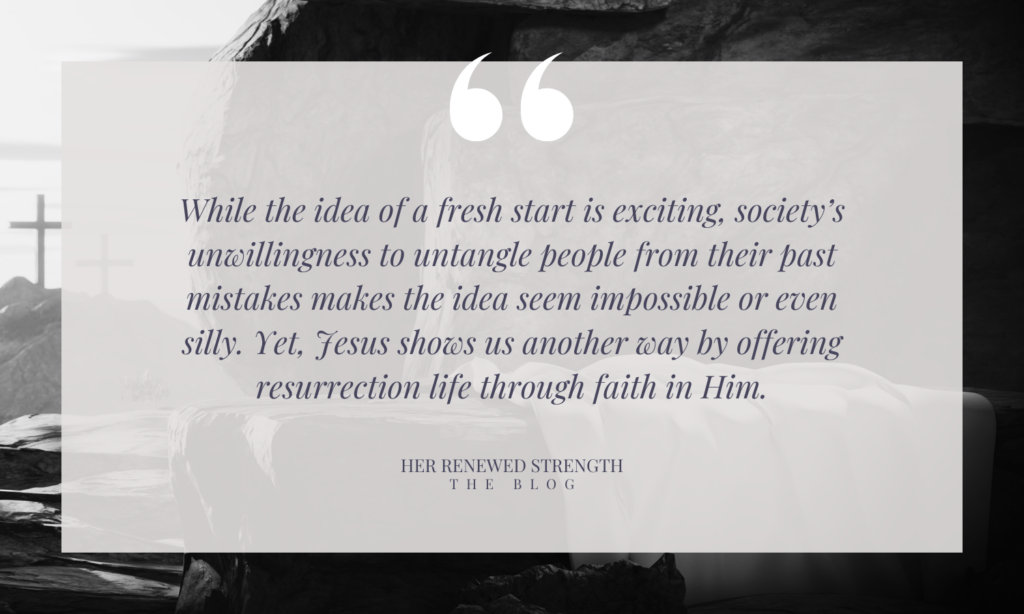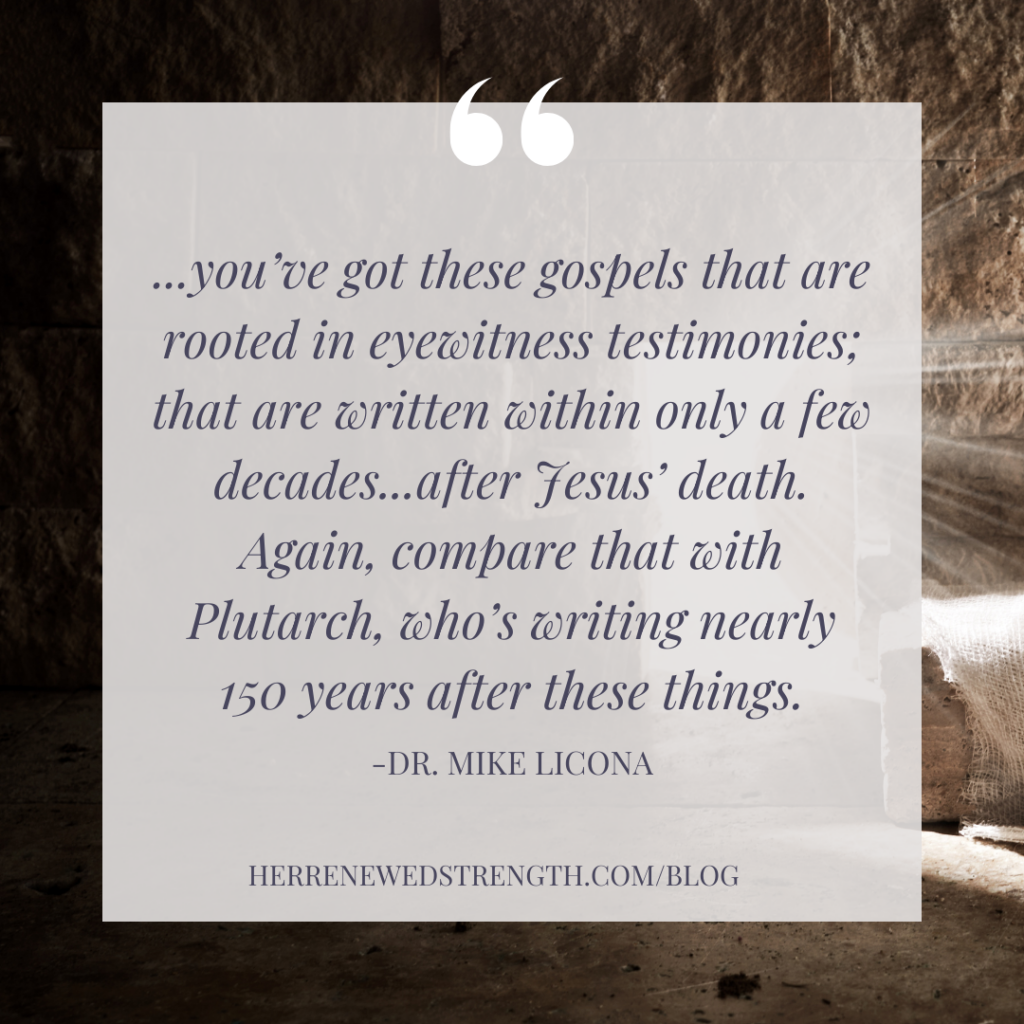How I Detoxed in Just 3 Days [Exact Steps]
Mind + Body
5 Signs You Should Break Up With Social Media
Mind + Body
How I Changed My Entire Life in 365 Days
Motivation
My Morning Matcha Recipe [Bonus Recipes]
nutrition
Browse around
topics
Hey!
I'm Erika...
I never once thought I would have a deep love of God's Word or desire a deeper study of theology. God had other plans. So, I'm on a mission to share that love with other Christian women and help them discover it for themselves.
Read my story
Listen to the top 2% globally ranked podcast!
PODCAST
Join our private Facebook community!
COMMUNITY
Learn more about private coaching!
coaching
Grab your gift to simplify Bible study today!
FREE GIFT
Free Theology Class!
Her Renewed Strength Co. is proud to present this FREE, 45-minute theology class uncovering Christian orthodoxy and ancient heresies that continue to live on today. Know what you believe and identify counterfeit teachings that distort the truth of God's Word.
Examining the Evidence for Jesus’ Resurrection

Posted In
April 21, 2025
Posted On

At the point that I decided to put my faith in Christ and accept Him as my Lord and Savior, I had already spent months researching near-death experiences. Reading someone the testimony others shared helped me to believe that heaven is a real place and that God is a real person. Those testimonies helped me to believe “new life” was possible. Interestingly enough, it wasn’t until years after I became a Christian that I fully appreciated the greatest story of “new life” ever told: the resurrection of Jesus and the new life Christians receive when they become believers.
After becoming a Christian, I quickly realized how many of my friends did not share my beliefs and convictions. Gradually, I engaged with others who pushed back on the historicity of biblical accounts, including the resurrection of Jesus. I didn’t know it then, but I was engaging in apologetics, the defense of the Christian faith.
As I grew in my faith, my study of God’s Word led to theological questions I sought answers to, resulting in a passion for Christian theology. After learning there was a formal branch of Christian theology called [Christian] apologetics, I realized I had been passionate about it since before I knew it existed.
I think back to the conversations I had with friends who didn’t share my faith in Christ and one of the objections raised dealt with the lack of evidence for a physical resurrection. Frankly, if there was no resurrection, there would be no Christianity. Suffice it to say that any request for evidence of a resurrection is reasonable. Yet, the objection I encountered was put forth without any request for evidence. Instead, the objection was presented and coupled with an assertion that there is a complete lack of evidence.
I don’t intend to squabble over semantics, so hear me out. My interest isn’t in saying the right thing but in asking good questions that lead to true answers, especially as it pertains to matters of [new] life and death. Is it possible that Jesus truly came back from the dead? If He did, does it mean that those who put their faith in Him are offered a new life?
Let’s be honest, while the idea of a fresh start [i.e. new life in Christ] is exciting, society’s unwillingness to untangle people from their past mistakes makes the idea seem impossible or even silly. Yet, Jesus shows us another way by offering new life through faith in Him. It sounds simple, but when you consider what it takes, i.e. swallowing your pride, admitting you are a sinner, believing that the miracle of His resurrection truly happened, it’s incredibly difficult. This is why so many Christians believe mankind can’t actually choose to put their faith in Christ apart from a work of the Holy Spirit in a person. That’s a different topic for a different day.

I recently shared a conversation I had with New Testament scholar and apologist, Dr. Mike Licona. Dr. Licona wrote his dissertation on the resurrection of Jesus and later it published it. You can get your copy of The Resurrection of Jesus: A New Historiographical Approach by Dr. Mike Licona by clicking here.* During this discussion, I asked him for the best evidence for the resurrection of Jesus Christ.
In a nutshell, he presented evidence that makes the case for the resurrection of Christ compelling.
What evidence supports the resurrection of Jesus?
Dr. Licona shared about a few different types of evidence, including:
- the gospel accounts, which serve as first-hand, eyewitness accounts.
- other sources that attest to the life of Christ and the fact that his followers are still around today, i.e. Josephus, a Jewish historian who wrote about the crucifixion of Jesus in The Testimonium Flavianum.
- Paul’s testimony, probably the strongest piece of evidence because of Paul’s history with Christians and the path he went down after he believed to have an encounter with the risen Jesus.
If you’re like me, you may wonder what objections skeptics would raise in response to these types of evidence. I asked Dr. Licona during our discussion and he explored a few. The two primary objections that stood out dealt with 1. the timeframe between the writing of the gospel accounts, and 2. the hallucination theory as an explanation for why some claimed to have seen the risen Jesus.
Let’s explore the two primary objections to the evidence for the resurrection.
1. The amount of time between the resurrection and the authorship of the gospel accounts.
I can understand why one might contest the timeframe between the resurrection of Jesus and the authorship of the gospels. Most scholars place the gospel writings between 70 and 90 A.D., including Bart Ehrman, an atheist New Testament critic whom Dr. Licona debated over half a dozen times. If the gospel accounts were written 40-60 years after the resurrection, the rational mind might doubt the accuracy of any recorded events. However, Plutarch, a Greek philosopher, historian, and biographer, became most well-known for the Parallel Lives, a series of biographies he wrote. Plutarch wrote 150 years after those he wrote about, yet his work and the information he included was, to the knowledge of Christopher Pelling, never contested. (Fun Fact: Christopher Pelling is the foremost Plutarch expert in the world and Dr. Licona corresponded with him to get his opinion on this matter. Pretty cool, right?)
It goes without saying, as Dr. Licona put it during our discussion, that “reporting about Cesar’s crossing the Rubicon and reporting that someone walked on water or was raised from the dead are different kinds of events.” Yet, I stand back and consider the concern raised in questioning the timeframe of the gospel accounts and can’t help but think about this: trying to account for minor details 40-60 years later will of course be a challenge, but when people recall a major event, like the resurrection of Christ, they remember it no matter how much time has passed.
As an example, I’ll just briefly share that I lived in NJ until I was in my late twenties. I grew up right across the Hudson in a city called Newark, NJ. With no traffic, I could get on 280, take that to 1/9 toward Jersey City in about 12-minutes then cross the Holland Tunnel and land in downtown Manhattan. I could just as easily get on the Lightrail, take that to Newark Penn Station and take the PATH train to WTC. That’s right. I could be at Ground Zero in about 20-minutes on a really good day. The World Trade Center’s Twin Towers were visible from the hill I lived on. On 9/11/2001, I was thirteen years old. Over twenty years later, I can still recall with precision what happened on that day, where I was, and how that day played out in my life. Why? Because it was a major, life-changing event. I might not be able to tell you about every time I drove through the Holland or looked over toward the Twin Towers before 9/11/2001, but I can tell you everything that happened THAT DAY. I suspect that everyone who was around on the day Jesus was crucified and everyone who was around when He rose from the dead would forever be changed and tell about it until their last day.
2. The hallucination theory is an explanation for why some claimed to have seen the risen Jesus.
Dr. Licona gave three issues that illustrate why the hallucination theory simply doesn’t work. The first is that the percentage of percipients is too high. He explained that the largest group most likely to experience a hallucination are people bereaving the loss of a loved one, i.e. a spouse you’ve been married to for 50 years. Only 7% of the people in that group experience a visual hallucination of the person being grieved. With the disciples, according to the earliest reports, a whopping 100% experienced what they interpreted as an appearance of the risen Jesus to them.
The second issue is that there is no evidence to suggest that group hallucinations actually occur. Dr. Licona did some research on the matter and found a book put out by the American Psychological Association, titled, Hallucinations: The Science of Idiosyncratic Perception. He contacted the authors to inquire about why there was no information about group hallucinations and received a response from one. Ultimately, the authors could find no strongly documented case of group hallucinations. Dr. Licona described group hallucinations as “false sensory perceptions,” which are pretty much impossible to experience, even if just two people attempt to engage in the same perception, i.e. a wife telling her husband to meet her in her dream so they can have a free vacation together. To make an argument for 500 people having experienced the same false sensory perception should be regarded as an impossibility.
The third issue is that Paul, formerly known as Saul, was not grieving the death of Jesus, yet had, what he interpreted to be, a real encounter with the risen Jesus. This alone puts to death any potential the hallucination theory had to be a viable objection.

At the point that I surrendered to the Holy Spirit’s work in my heart and mind, I hadn’t even heard of anything I shared in this post. I knew that if other people, humans just like me, had experienced an afterlife and described it so similarly, one who was a neuroscientist and knew his brain could not dream in the state he was in, then I had no reason to continue to doubt that Jesus had truly died and resurrected. Why hadn’t the testimony about Jesus been enough? Well, the truth is that, even though I went to Catholic school for twelve years and completed all my CCD classes, I hadn’t actually studied the Bible. Whatever I had learned up to that point fell on deaf ears and failed to penetrate my heart.
After I became a Christian, I decided it was time to read the Bible [shout out my peeps who have read the Bible in a year!] and get familiar with what I signed up for. That’s where the real change and transformation occurred. Sure, I had questions that begged for answers. Sure, it was hard to understand what I read the first time around. Sure, I wondered how true and accurate everything was.
The beautiful thing about God is that He is not afraid of our questions. When I asked, He somehow made a way for me to be met with resources that helped me find answers. I believe the Lord knows how each of us operates and receives information. I believe He knew I wouldn’t just take someone’s word for it and accept the first answer I got in response to my hard questions. I believe the Lord knew I would need to study and wrestle on my own before I could accept anything as true. He was patient to meet me where I was and faithful to provide what I needed to pursue truth.
My hope is that, if you’re seeking or doubting or just skeptical, you will ask God your hard questions and believe, even if just a little, that He will make a way for you to receive answers. I do believe my conversation with Dr. Licona is a great place to start, so I encourage you to go to that episode, take some notes, and write down your questions. Pray and ask the Lord for understanding and, as it says in the gospel of Matthew, “Ask, and it will be given to you; seek, and you will find; knock, and it will be opened to you.” Matthew 7:7

Praying for your faith and thanking God for your support.
Happy Resurrection Sunday!
HE IS RISEN. 🤍
-E
*By using these affiliate links, you help me earn a commission from your purchase at no additional cost to you. You don’t need to use the affiliate links, but they do help to fund HRS operations, including all content creation.
Pin
Share
Leave a Reply Cancel reply
6 Ways To Start Your Morning Off Right
Mind + Body
Chia Seed Recipes For Keto
NUTRITION
My Morning Matcha Recipe [Bonus Recipes]
nutrition
How I Changed My Entire Life in 365 Days
Motivation
5 Signs You Should Break Up With Social Media
Mind + Body
Mind + Body
How I Detoxed in Just 3 Days [Exact Steps]
You May Also
Previous Story
next Story
© 2025 Her Renewed Strength Co.
tune into one of our most downloaded episodes!
Struggling To Hold It All Together? Here’s Your 3 Step Spiritual Battle Plan Against Negative Self-Talk Stemming From To-Do List Anxiety, Past Hurts or Daily Time Management Stress!
HELPING MORE WOMEN GET IN THE WORD OF GOD & GROW IN THEIR FAITH
BLOG
I'm so glad you're here. I look forward to connecting with you. Blessings! -E